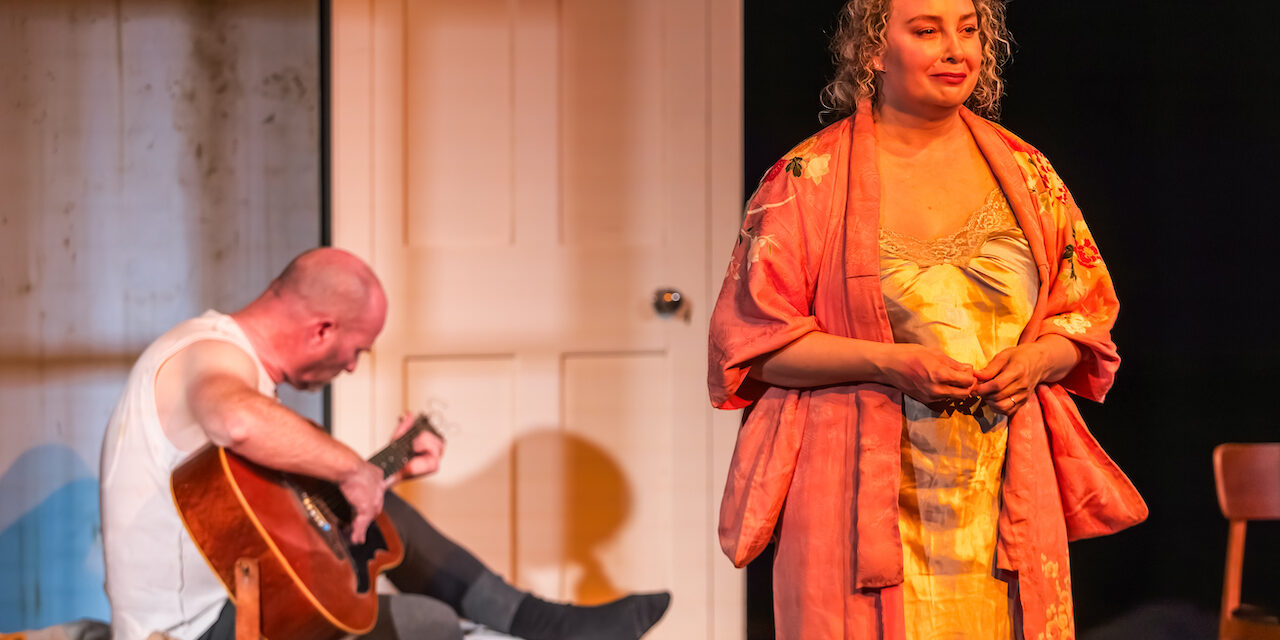
9 – 12 April
Tennessee Williams is of course best known for his hugely successful plays such as A Streetcar Named Desire, Cat on a Hot Tin Roof and The Glass Menagerie, all of which have deservedly taken their place in the pantheon of great twentieth century drama, but perhaps less well-known is his collection of nearly forty one-act plays which explore many of the same themes. Fox and Hounds Theatre Company have chosen three of these shorter works and skilfully woven them together to explore two of Williams’ central concerns: the entrapment of women, and the futility and hopelessness of the working classes in post-Depression America. Performed in the close confines of the Everyman’s Irving Studio Theatre, this is an intense, moving and, at times, claustrophobic experience.
Ivan’s Widow is perhaps the least satisfying of the three, possibly reflecting the fact that this short play remained a rough draft at the time of Williams’ death in 1983. Massimiliano Acerbi exudes both menace and charm as a predatory counsellor to Helen Fox’s grieving widow, herself a conflicted character struggling with the twin demons of grief and the bottle. Acerbi has not quite mastered the Southern drawl yet, but this does not detract from a strong two-handed performance where we are forced to question which character is really telling the truth right up until the play’s shocking denouement. A simple but highly effective set includes three portable doors, two of which are symbolically locked to reinforce the widow’s entrapment.
By contrast, Talk to Me Like the Rain and Let Me Listen is a more lyrical, almost poetic, exploration, via two monologues, of the vicious circle of unhappiness and deprivation inhabited by an unnamed couple. Fox remains on stage, but is joined by Codge Crawford, one of the company’s founding members, who portrays the alcoholic husband who drinks his way from one pay cheque to the next. While Fox plays his spouse, trapped behind the bars of her window, and much like the similarly unnamed Curley’s wife in Of Mice and Men, dreams of escape and a better life which she is destined never to attain.
However, it is the third and final play which leaves the biggest impression – a visceral and uncompromising study of the abuse and subjugation inflicted on women. 27 Wagons Full of Cotton is the most fleshed-out of these three plays and explores two men’s exploitation and abuse of the helpless Flora Meigham – her manipulative husband Jake, and Silva Vicarro, a business rival who seeks revenge for Jake’s arson attack on his cotton gin. Flora’s desperation and entrapment is well captured by Fox’s superb acting, flanked by Acerbi and Crawford’s shocking but convincing portrayal of her abusers. It is harrowing, raw and powerful.
Ellie Jay Stephens’ direction, allied to strong performances from all three actors, and a simple but versatile set, vividly depicts the social realities and attitudes of Williams’ era, with the occasionally shocking, but unedited, language reinforcing this. The playwright was particularly motivated by the treatment of women at the time, and yet the female characters within these plays do not lack hope. As Williams himself suggested, “Seemingly fragile people are the strong ones really….”, and whilst at times these vignettes make for distinctly uncomfortable viewing, the production serves to show how far society has come since Williams’ day….and perhaps how far we still have to go.
★★★★☆ Tony Clarke, 11 April 2024
Photo credit: Craig Fuller


